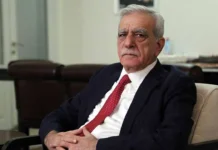The son of Sadrettin Sarıkaya, a former specially authorized prosecutor who was arrested on charges of membership in the Gülen movement in 2017, has pleaded for the release of his father, who remains in prison despite suffering from a brain tumor and other health problems.
Sarıkaya, known as the prosecutor who had called Hakan Fidan, the head of Turkey’s notorious National Intelligence Organization (MİT), for testimony as part of a 2012 investigation into the outlawed Kurdistan Workers’ Party (PKK), was dismissed from his job over alleged links to the Gülen movement and jailed pending trial in February 2017.
The Turkish government accuses the Gülen movement, a religious group inspired by Turkish cleric Fethullah Gülen, of masterminding a coup attempt in July 2016 and labels it a terrorist organization. The movement strongly denies involvement in the coup attempt or any terrorist activity.
Daha neyi bekliyorusunuz!!?? Yaşam hakkını daha fazla ihlal etmemek için daha neyi bekliyorsunuz @AYMBASKANLIGI @TCYargitay @abdulhamitgul @TutukluHastalar pic.twitter.com/9Fp5zVIInN
— Seyfullah SARIKAYA (@seyiso7534) September 7, 2020
Following his arrest on February 18, 2017, Sarıkaya was placed in an isolated prison cell pending trial and remained in isolation for 805 days. His son, Seyfullah Sarıkaya, said from his social media account that his father was suffering from multiple health problems. “My father suffers from a brain tumor. He has high blood pressure, and his kidney is failing. I now ask the Supreme Court of Appeals, what are they waiting for to release him?”
His son also explained that it was incredibly difficult for Sarıkaya to get the necessary treatment because of the coronavirus pandemic, since each hospital visit was followed by a 14-day quarantine period in an isolation cell. He said the isolation conditions have forced Sarıkaya to refuse hospital visits.
Sarıkaya had applied to the Constitutional Court to review his case and his extensive pretrial detention, and to take steps to release him pending trial. According to executive decrees issued after the coup attempt, the period of pretrial detention for people arrested on accusations of aiding and supporting a terrorist organization, espionage or involvement in a coup attempt can now be extended up to seven years. The period was previously limited to a five-year maximum.
Following the coup attempt, the Turkish government declared a state of emergency and launched a massive crackdown on followers of the Gülen movement under the pretext of an anti-coup fight. Over 540,000 people were detained on terrorism-related charges, more than 80,000 were arrested or imprisoned and over 150,000 public servants were summarily removed, including 4,145 judges and prosecutors, from their jobs for alleged membership in or relationships with “terrorist organizations.” The purge mainly targeted people who were allegedly affiliated with the Gülen movement but included other people from a wide variety of backgrounds as well.















